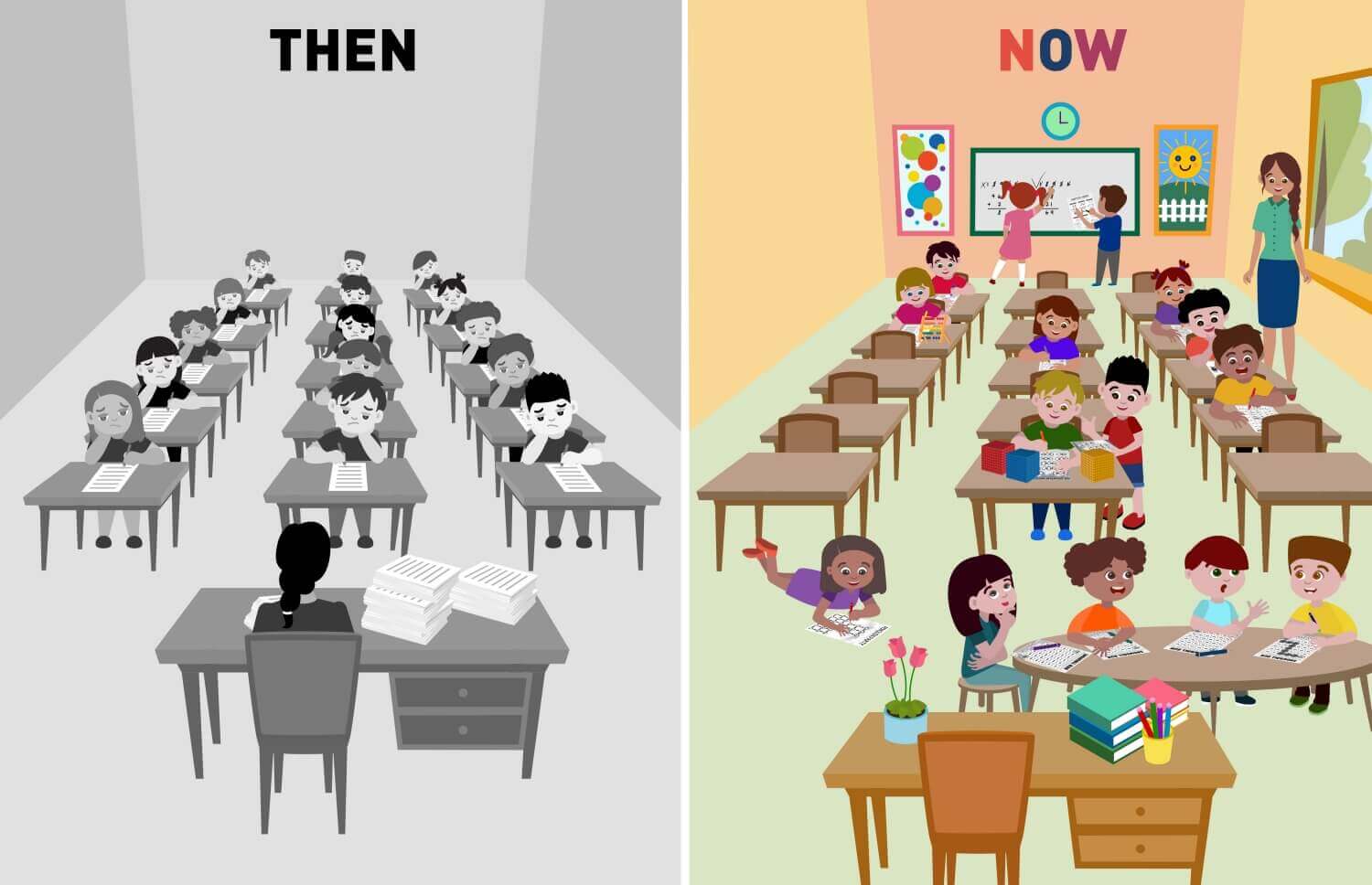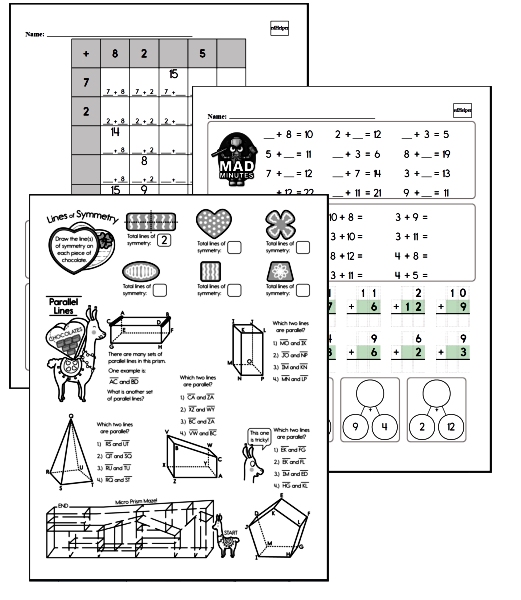Does mindset in math really matter? How to help your students succeed! (with Math Chapter 3 Workbooks)
By: edHelper Staff
Updated: Nov 23, 2020
Smile. Right this second. Stop and smile and see what happens. Science has proven that smiling can rewire your brain. It changes the way you see things and the way you perceive situations. Our brains (and bodies!) are that powerful. If a simple smile can change how we view our day, can you imagine what a positive mindset can do? Perhaps more importantly, can you imagine what it could do for our students who struggle? Research has shown that our beliefs are indicative of our potential. If you believe that you are good at something, you are already on the right path to becoming great at it!
When it comes to learning math, a growth mindset may be more important than a student's initial ability. Students with a growth mindset tend to progress in their mathematical understanding faster than students who have a fixed mindset. This is due in part to the fact that they believe that with enough practice, they can be good at math!
What are the differences between those with a growth mindset and those with a fixed mindset? Here are some specific things that students with growth mindsets think and believe:
Chapter 3 Math Workbooks
Mistakes are an opportunity
They recognize that each mistake is a chance to learn. Mistakes are truly proof that we are trying. Each mistake brings a chance to build resilience and grow.
Hard work pays off
Students who adopt a growth mindset in math know that their effort is indicative of success. They recognize and acknowledge that hard work, while it is in fact hard, leads to success! Their effort matches their outcome.
They are capable of learning
Part of having a growth mindset involves being mindful of your learning strategies and preferences. These students think about how they learn, not just what they learn. They set themselves up for success by studying the strategies that work for them and working to reinforce key concepts and skills in a way that makes sense.
Skills, talent, and ability are not inherited
While genes clearly play a role in how tall our students may become, or may lend themselves to making some people more naturally athletic than others, being "good" at math is not an inherited trait. Students with a growth mindset truly believe that they can develop into brilliant mathematicians! They know that given enough practice and perseverance, they can be wildly successful in any subject.
Research shows that a growth mindset in math not only keeps students engaged and motivated, it also plays a large role in students earning higher GPAs, scoring better on standardized tests, and pursuing educational opportunities after high school.
Now that we know how beneficial it can be, how can we help students develop a growth mindset in math?
Send the right message
Create a classroom culture where students are praised for effort and vulnerability. Celebrate mistakes! For students to develop a growth mindset, they have to know it's safe to try, fail, and try again.
Encourage students to change the way they speak to themselves about math as well. Rather than saying, "I'm not good at this," encourage students to tell themselves, "What am I missing? Let me look again." Replace "This is hard" with "This will take some time and effort, but I can do it!"
Likewise, be mindful of the words you use when praising your students' math successes. Try using phrases like "You are on the right track!" or "I can really see your effort and thinking," as opposed to "You are so good at math!" Part of encouraging our students to continue developing a growth mindset in math is helping them become keenly aware that their effort and perseverance play a huge role in determining success.
Give students quality, engaging math tasks
It's important to create "just right" learning opportunities for our students if we hope to encourage a growth mindset. A task that is too easy doesn't require enough problem-solving or critical thinking. A task that is too challenging will leave students frustrated and ready to give up, even while striving to persevere and use their strategies.
Math chapter workbooks can be that "just right" resource for your students. Designed to present sequential skills and standards, edHelper's math workbooks engage students with a variety of creative print and online practice opportunities. Providing intentional practice has been known to help students develop their math skills at all grade levels.
Math Chapter 3 Freebie Workbooks
The Chapter 3 workbooks available at edHelper.com are great to use toward the beginning of the year or for spiral review at any time. Each grade-level book is filled with age-appropriate practice opportunities centered around Common Core standards.
Grade 1
First Grade Math Book - Addition Facts to 10
First-graders will spend more than half the year just learning addition and subtraction. In this chapter, they will work with easy addends, or counting numbers and identifying their role in addition problems. This exciting workbook combines part-and-whole activities, creative word problems, and engaging images. Coupled with online math practice, this book will not only help your first graders develop their skills, but it will help them with their mindset as well.
Grade 2
Second Grade Math Book - Subtraction up to 1,000
This second-grade workbook will take a deep dive into the world of subtraction, with regrouping, up to 1,000. Let the friendly narwhal and all his sea life buddies lead your students on a mesmerizing math adventure. Students will work with bar graphs, creative "search for the equation" puzzles, two-step math problems, and "Let's play" online math practice to help build fluency. This workbook will provide the opportunity that they need to think about math and practice various problem-solving strategies, all of which lead students to develop their growth mindset.
Grade 3
Third Grade Math Book - Addition Up to 10,000
Third grade is the year of multiplication. This can, traditionally, be a struggle for students as they make the jump from simple addition and subtraction to repeated addition and multiplication. A growth mindset is key when it comes to making this shift! Very few students will instinctively grasp these new concepts, but with hard work and perseverance, they can succeed and excel! This math workbook not only presents opportunities for students to work on their addition up to 10,000 by finding missing addends and solving for the sum but also introduces long division in stepped out problems. It allows students to work on double-digit multiplication while "cracking the code" and use fun puzzles to build fluency. As always, this chapter book prompts students to head to the online game center for additional purposeful practice. It's the perfect blend of online and offline practice.
Grade 4
Fourth Grade Math Book - Whole Number Multiplication and Division
Students spend the first few years of formal math education developing a deep and complex understanding of both addition and subtraction, with a little bit of multiplication sprinkled in. By the 4th grade, students are ready to develop their multiplication and division skills. This workbook helps introduce larger and more complex problems as students continue to progress. The problems in this workbook will help students work through each of the steps in multiplication and long division problems with neatly arranged boxes for each of their digits. Don't tell them yet, but these pages are actually fun! Your students will enjoy the riddles, word problems, and engaging opportunities to continue strengthening their skills.
Grade 5
Fifth Grade Math Book - Fractions and Mixed Numbers
What do crazy monsters and deep-sea diving students have in common? Normally, not a whole lot, but in this workbook, they both help your students become more fluent with fractions! A strong understanding of fractions is vital for continued math success, as students need to understand the fractional numbers that lay between whole digits. This workbook provides opportunities for them to add with mixed numbers, work with unlike fractions, and express fractions as decimals. While these might seem like scary concepts, the goofy graphics and math monsters will give your mathematicians plenty to smile about as they make their way through the pages. This thoughtfully designed 5th-grade book presents the perfect amount of online and offline practice while keeping students engaged in a variety of modalities. Use it to strengthen their fraction skills as well as their math mindset!
Mindset and Purposeful Practice
As students continue to progress through all of their math skills and standards throughout the year, mindset and purposeful practice will be crucial for their success. Create an environment where effort is celebrated over product, but provide multiple opportunities for students to stretch and grow into mathematicians that use effort and resilience to find those correct answers. Step-by-step, day-by-day, you will be helping students on their path to success! Keep encouraging your students to put in the hard work that is necessary to reap the rewards in math, and they will come to see that they are capable of reaping great rewards in life as well!


